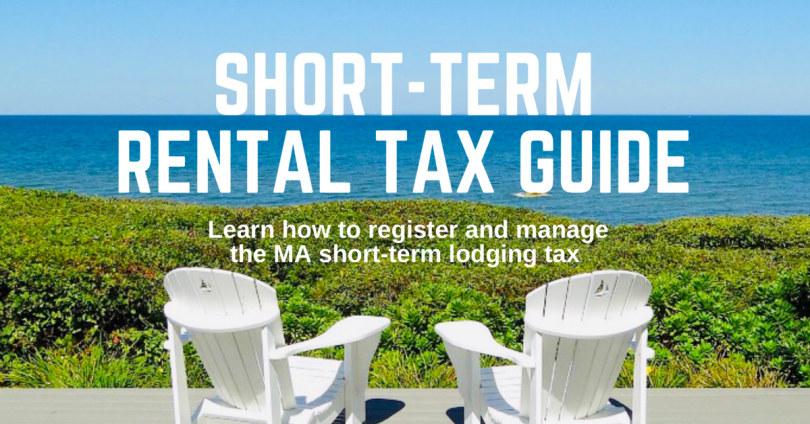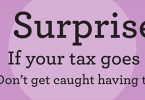Updated April 2023
Register with the Massachusetts Department of Revenue (DOR)
The DOR offers a clear and helpful FAQs page with information about registering as an “operator.” (Note: You are considered an “Operator.”)
To register, go to this registration page.
FAQ’s About the Short-Term Rental Tax
What does the law require?
The law expands the state’s hotel and motel tax to include the short-term rental of homes and condos. “Short term” refers to any rental period of 31 days or less, so annual or long-term rentals are excluded from the tax.
When did the tax go into effect?
The tax went into effect on January 1, 2019.
What if a town increases its local excise rate or imposes a new fee? How does that affect my tax collection responsibilities?
Some towns have voted to increase the local tax or add a fee. The tax is whatever the rate is at the time of tenancy, not the date when the lease was signed. This is what the DOR says about an increase in fees or a new fee:
“If an occupancy occurs after a rate increases or a new fee is imposed, whoever collects the rent must collect any amounts due from occupants that were not paid prior to occupancy. Lease contracts should include provisions that all state and local taxes and fees are due as of the date of occupancy, so occupants are aware that additional amounts may be due if rate or fee changes occur after a contract is signed. Whoever collects the rent is responsible for the payment of the tax or fee due based on the effective date of the change, not the date a contract was signed or any money was collected.”
How much is the tax?
The tax is the total of these taxes:
- State tax: 5.7%
- Local tax: up to 6%. View a chart of Short-Term Lodging Tax Percentage by Town. (Note: Many towns, especially those that originally charged only 4%, have voted to increase their Lodging Tax rates.)
- Cape and Islands wastewater treatment tax: 2.75% (To date, all Martha’s Vineyard and Nantucket and “Just off Cape” properties are exempt.)
- A town can assess an additional 3% Community Impact tax if the homeowner owns more than one rental home in the same town.
Are there any exemptions to the law?
You are exempt if you rent your home for 14 days or fewer per calendar year. However, you are still required to register your home and provide insurance. (See below for more details about insurance requirements). “Short-term” refers to any rental period of 31 days or less. Therefore, annual or long-term rentals are excluded from the tax.
Do I need to register my home?
Yes, operators of short-term rentals must register with MassTaxConnect (even if you are exempt from the tax because you rent for 14 days or fewer).
Your town may also require a separate registration and registration fee. See a list of the towns that currently require registration.
How do I register?
You register via the website MassTaxConnect. (See a link to the how-to tutorial videos below.)
When and how do I remit the tax?
When: As of April 1, 2021, the tax is due to the state via MassTaxConnect by the 30th of the month after your guests’ departures. So, for example, if you have three rental parties who depart in July, all their taxes will be due by August 30.
How: To remit the tax, go to MassTaxConnect, log in, and look for the “Make a Payment” link in the “Room Occupancy Consolidated” section.
What form of payment will the Department of Revenue accept?
Payment can be made by electronic transfer from your checking or savings account. Otherwise, if you pay by debit or credit card, there is a 2.35% convenience fee.
What specifically do I make a payment for on the 30th of the month?
You would remit the tax for the taxable rentals that you had the previous month. The taxes remitted would include state excise and any local option excise, including the 2.75% Water Protection Fund excise. The state will retain its 5.7% and remit the balance to your town.
What if I rent my home by the week in the summer but long term (for more than a month to one party) in the winter?
Your short-term tenants would pay a tax, and you would remit the tax for those months. No tax would be due for your long-term tenant, nor would you need to file a return for the months of the long-term tenancy.
What items are taxable?
Taxable items include the rent and any other non-refundable charges, including cleaning, linen, or pet fees.
Should I absorb any of this tax myself?
No, the lodging tax is meant to be paid by the renters, just like they would pay the tax at a hotel or motel.
A lodging tax for private rentals is common in many parts of the country, including every other New England state, so vacationers are accustomed to paying one. And keep in mind that renters will have to pay this tax no matter which home they choose.
How should I present the tax on my listing?
We now provide this language on all listings: “State and local taxes of X% will apply.” The exact percentage is determined by the town in which your rental home is located. This language is posted on your listing at just below the pricing chart near the top of your listing as well as at the top of your Pricing and Availability section. But you should NOT incorporate the tax within the rates posted on your Calendar. If your guests are exempt from the Lodging Tax due to your only renting for 14 days or less per year, please let us know so that we can update your listing accordingly.
Which homes are subject to the Wastewater Tax?
Only the 15 towns in Barnstable County are subject to the Wastewater Tax. The Vineyard and Nantucket are not part of the Cape Cod and Islands Water Protection Fund, and until and unless they opt into the Trust by majority vote of town meeting, they will not collect the 2.75%.
Any homes located in Off-Cape towns are also not subject to the Wastewater Tax.
How can I determine what amount my town is assessing for the local tax?
For a full list of towns listed on our site and what percentage they are each assessing, see our blog post Short-Term Lodging Tax Percentage by Town.
Do Martha’s Vineyard and Nantucket require collection of the Wastewater Tax?
No, only the 15 towns in Barnstable County are subject to the 2.75% Wastewater Tax. Nantucket and the Vineyard are not currently part of the Cape Cod and Islands Water Protection Fund. Nantucket may opt into the Trust by majority vote of town meeting.
Are safety inspections required?
Towns may implement a health and safety inspection requirement and determine the frequency of the inspection. Homeowners would be required to cover the cost of the inspection. Check with your town for details.
Am I required to carry insurance for my home?
Massachusetts law requires homeowners to maintain a minimum of $1M in liability insurance to cover a rental home. This coverage shall defend and indemnify the owner and any tenants in the home for bodily injury and property damage arising from the short-term rental. Check with your insurance agent to be sure that you have adequate liability insurance and that there are no exclusions for short-term rental coverage. If your carrier does not provide the required $1M liability coverage, you might need to take out an umbrella policy to supplement your current policy or switch to a different provider. For more information, please visit: https://www.mass.gov/service-details/short-term-rental-insurance.
Should renters send a separate check for the taxes?
It is not necessary for renters to send a separate check for the taxes. Whether by check or credit card, the taxes could be combined. Homeowners are responsible for keeping track of the tax, however, so that they can remit it by the required date.
If I didn’t have any taxable rentals during the previous month, do I still need to file with MassTaxConnect?
No, if you had no taxable rentals during the previous month, you do NOT need to log in and file a “0” payment. The only month for which you need to file are those in which you had one or more taxable rentals.
Helpful Rental Tax Resources
Dept. of Revenue FAQ’s web page:
https://www.mass.gov/info-details/room-occupancy-excise-tax
Tax Department (617) 887-6367
Toll-free in Massachusetts (800) 392-6089
8:30 a.m.–4:00 p.m., Monday through Friday
Text of the law:
https://malegislature.gov/Laws/SessionLaws/Acts/2018/Chapter337
Sen. Julian Cyr
Boston Office 617-722-1570, District Office 508-237-7001. Email Julian.Cyr@masenate.gov
Tax Percentages for each town
Short-Term Lodging Tax Percentage by Town








Is it possible to register and pay the tax on paper forms and send them USPS?
BOB on Nantucket
Hi, Bob, unfortunately, no. It is necessary for all of us to register online and pay by logging in to your account with the DOR online. In fact, payments must either be by EFT (Electronic Funds Transfer) for free, or you will be charged a “convenience fee” if you opt instead to pay by credit card. But nothing is done by paper forms or checks.
I would love to see your sample lease, especially how to word the part about the new taxes – Thanks a lot.
Hi, Barbara, I’d be happy to email you a copy of our sample lease, including the line item referring to the lodging tax.
If the rental week for a single renter starts the end of August and continues a couple of days into September, how do we report that rental income for the month? Do we have to split the amount to account for rental tax in August and September? Thx.
Hi, Lisa, like in a hotel stay, the tax is based on the check OUT date of your guest, and therefore due by the 20th of the following month. In the example you gave, you would not remit the tax for the guest’s stay until October 20.
what are the penalties if you don’t report the sttax?
Good question, Sal! We have no idea what the repercussions are for not registering or paying the tax. We have been told by the DOR that there would be penalties for late filing and late payment of the tax, but they have not been specific.
Hi Elizabeth –
we have been renting our home through your site for several summer weeks over the past five years – fortunately this year we had nearly all repeat renters who booked last year. I do however have two leases that were signed this year and will have to collect and pay the new tax on those contracts: if we choose to no longer rent our home going forward do we still have to register to pay the small amount of tax on these remaining two taxable leases or can I send in the tax due regardless?
thanks Gordon
Hi, Gordon, if I understand you correctly, yes, you would need to register, even if you won’t be renting any longer in the future. The reason is because you have to register in order to pay the tax for the 2 taxable weeks from this year. Payment of the tax must be online, and the only way to submit it is to log in to the account that is created when you register. Sorry!
Elizabeth
Hi Joan,
The email I just received from We Need a Vacation. The info regarding the lodging tax payment due August 20th notes, in pertinent part: “Even if you have no taxes due for July, log into your account and indicate 0 taxes due. ” However, Mass.gov Room Occupancy frequently asked questions (https://www.mass.gov/info-details/room-occupancy-frequently-asked-questions) indicates the following “I only rent my property at certain times of the year. “Do I have to file a return even if I have no rental every month?
No. A return is required to be filed only for any month when tax is due. If no tax is due, no return is required to be filed.”
It would seem that Mass FAQs states that a return is due ONLY for any month when a tax is due. This is contrary to the email which advises that a return should be filed for July even if there is zero tax due. Would you be so kind as to clarify what the correct procedure is? Should a return be filed even if no tax is due as it states with Mass.gov Room Occupancy FAQs?
Hi, Richard, my apologies for not responding sooner. Since then, Joan replied to you by email, and for the sake of other readers, here’s what she wrote:
“Originally, my contact at the Department of Revenue told us that taxes had to be paid every month and that if there were no taxes due for a given month, we would still have to put “0” on the form.
Then we were told that we would indicate which months we typically rent our homes, and we would have to file a return for each of those months, whether an actual amount or “0” if no tax was collected for that month.
Now the DOR is saying that we do not have to go into our account at all if we did not collect tax for a given month. And that is their “final answer.” (I asked them twice just to be sure.)
We have updated our FAQs with this item:
If I didn’t have any taxable rentals during the previous month, do I still need to file with MassTaxConnect?
No, if you had no taxable rentals during the previous month, you do NOT need to log in and file a “0” payment. The only month for which you need to file are those in which you had one or more taxable rentals.”
Hopefully, this answers your question.
If a rental starts on June 30 into July is it taxable?
No, Kathleen, only rentals that BEGAN on July 1 or afterwards are subject to the tax. Anyone arriving for the week on June 29 or 30 of this year were exempt.
Hi my lease is split 7 days in August and 25 days in November for a total of 32 days to the same guest. Is this exempt from the tax?
Hi Rick, Your question is an interesting one and one that I’m not sure the DOR addresses. Since the law doesn’t specify that the 31+ days must be consecutive, I would think there’s reason to believe that your 32-day guest is exempt from the tax.
Hi Elizabeth – Thank you. You continue to be an incredible resource with the wealth of information you provide. It is truly appreciated.
A question for you… I see on the MA Gov website the following as it relates to what is taxable: “The total amount of rent that is subject to tax includes all amounts paid by an occupant to an operator or intermediary, even if not required for occupancy. Rent includes all optional charges, including but not limited to the following: security deposits, insurance, linen fees, cleaning fees, service charges.” I was surprised to see security deposits included as taxable. How do you interpret that? Are we to tax the security deposit up front (along with the rent and non-refundable fees)? Or do you think the tax applies only to security deposits that aren’t returned after the stay because of damage?
Also do you have any recommendations as to what the tax provision should state in the lease?
Hi, Jill, The security deposit is taxed only if it is withheld. Otherwise, it is not taxable. So, you can choose to either tax it and return the tax along with the deposit or not tax it and take your chances that you won’t need to withhold any of it. If you do withhold any of it, you will be responsible for paying the tax on the amount you withhold.
And yes, you should simply add a line item in your lease for the Lodging Tax under the payments section. Let me know if you would like a copy of our sample short-term vacation rental lease.
Elizabeth
Hi Elizabeth,
Could you email me a copy of your sample lease for short-term rentals?
Thanks so much,
Becky
Yes, of course, Becky. I’ll send it right along.
Is it okay for me to share this blog with my renters? I’d like to give them the background about this new tax. Thanks for the clear information! Glad I noticed this with still a few months to work out insurance. What a pain the law is making us change/add to insurance policies… FYI, my insurance broker, who also has a rental on the Cape, said there are many options & one of the easiest (if my out of state primary residence insurer will allow) is an umbrella policy on the primary residence to make up the difference up to $1 mil liability on the rental property. Yet to be determined if my primary residence insurer will do this. Anyone else able to share what you are doing for insurance liability coverage?
Thank you for sharing the details. Was wondering if someone may have a sample lease showing all of the new line items for these charges included? I have a 2 week rental inquiry and will be charging a $500 refundable deposit as well as a cleaning fee and the possibility of a Pet Deposit. Want to be sure I capture all of this information correctly.
Hi, Kimberley, I have found your listing on our site and will happily forward you a copy of our sample lease. You can just add line items to it, including one for the Lodging Tax.
Hi Elizabeth,
We also have our home listed on your site, and would love to get a copy of the your sample lease agreement as well if possible. Our property ID # is 20909.
Thank you,
Laurie
I’ll email one to you shortly, Laurie.
Thank you everyone at WNAV for all the hard work you do. We would be lost without your organization.
I would also appreciate a copy of your lease. We have the tax listed in the lease based on the rental cost. This is not effected by the possible refundable cleaning costs.
Jean 28258
Ms Weedon
Could you send a sample lease to me?
Hi, Ann, yes, I’ll email you a copy of our sample lease today!
I rent my house in falmouth about 10 weeks a year and it is two bedrooms and I stay on the property during they my use my others rooms If I live in the house at the same time as my guest do i need to file It is my only resident and I am 76 years old
I notice that the tax is announced on the “Homeowners” page but I don’t see it anywhere
in your general info that is open to the public. Is We need a vacation going to add it somewhere in the calendar section or on their main home page?
I think it would be helpful for everyone involved. Perhaps it is there and I am just not
seeing it.
Hello ,
I’m kind of confess about the new taxes, does it being after July 1,2019 ?
Hi, Marie, I’m not sure exactly what you’re asking, but I think this information from the top of the FAQ’s might help: “The tax went into effect on January 1, 2019. Any lease signed on or after this date for a rental term beginning July 1, 2019, or later must include the rental tax.” So any leases you sign from now on for occupancy in your home starting July 1, 2019, or beyond are subject to the new tax.
So, one of my guests, rents for 28 days in June, which I price relatively low ($200 less than my Summer Rate) It looks like she would be better off next year to rent for 32 days. Do I need a different lease if it is not classified as a STR?
Yes, Sandy, she would save quite a lot if she rented at least 32 days from you as she wouldn’t have to pay any lodging tax at all. And, yes, you should probably use a lease for regular long-term rentals rather than one for STR’s.
There seems to be some confusion about the 14 days. I only rent my
condo for 2 weeks, (14 days). I have heard that for 14 days, I am exempt,
but I have also heard that the it is “less than” 14 days to be exempt?
Hi, Rick, If you rent for 14 DAYS OR LESS, you are exempt from charging the tax! Lucky you!
No, Rick, you were correct initially. Your guests are exempt from the tax as long as you rent for 14 Days OR LESS, not less than 14 days.
Are you at We Need a Vacation going to be required to provide a list of all your active accounts to the Comm. of Mass? If so, do you have to provide this list AFTER July 1?
If I have 15 family members and friends that come to my home each year and share expenses do I have to charge a meals tax on the lobsters that I pay for?
No, Ken, WeNeedaVacation.com is under no obligation to the Comm. of MA or the DOR at all as we have nothing to do with the collection or processing of our homeowners’ rental payments. As for your question about a meals tax, I have no idea, haha! But I’m guessing not neither you nor they are dining out at a restaurant.
Just wondering if when you say “collecting the lodging tax as a separate fee” that means that we need to request a separate payment from the renter for the amount of the taxes or if we can accept a single payment that includes both rental fees and tax? Thanks!
Hi, Dorian, we believe that you should be specific in requesting “the lodging tax as a separate fee” in your lease, for example, but RECEIPT of the fee can be included as a single payment with the balance of your rent and other fees if you like.
The Insurance issue will be big for all owners. A normal Homeowner policy of one Million dollars will not be sufficient. We are now all considered businesses and as such need to purchase a
business/commercial policy suitable for short term rentals. Ask your agent but demand to read the actual policy. Even agents do not realize that insurance companies will refuse to pay claims if it involves a short term rental and the policy is a traditional homeowner policy.
Be careful to check into this insurance matter.
Very good point, David! We encourage all of our homeowners to check their policies and discuss this issue with their agents.
What I have noticed and from my understanding is that other vacation sites already give a 1 million dollar policy and at least one of my realtors are also including that now as part of the rental. These policies are included with the rental and satisfy the law as I am being told. Can we expect this site to do the same? It is a significant savings if the site is covering the insurance for that particular rental (liability).
Hi, Chris, We do not provide $1 M insurance policy, and the primary reason is that we advertise and market the homes on our site but are not in any way involved in the actual financial and business end. The other sites, and realtors as well, collect the funds as well as service fees from vacationers and are directly involved in the rental transactions. HomeAway, for example, only gives the insurance coverage to rental transactions that go through them. If you were to block a week off on your HomeAway calendar for a booking you got through another source, that booking would not be covered by the insurance. We also do not charge vacationers a service fee to use our site, and, because the booking transactions are not done through us, there is no fee charged for processing any payments. And finally, our subscription rates are considerably below any of those charged to homeowners by the Big Box sites.
I have read several references to the act of registering your rental with the state. Please provide information on how to “register” a short-term rental property with the state.
Thank you!
Hi, Kathie, we are still waiting to hear how the registration process will work. As soon as we find out, we will update that information in the Lodging Tax FAQ’s post.
The FAQ above seems to indicate that the owner of the property will have to remit the taxes to the state. However the law seems to be pretty clear that ” An intermediary that enters into a written agreement with the operator to collect rent or facilitate the collection or payment of rent on behalf of the operator of an accommodation subject to the excise under this chapter shall … assess, collect, report and remit the excise …
So what gives?
Hi, David,
Whoever collects the rent from the tenants is responsible for also collecting the lodging tax as a separate fee. It could be collected along with the initial deposit or when the balance of the rent is paid. If you collect the funds for your rental, you will have to keep track of the tax, set it aside, and remit it to the state at a later date. If, however, you use an “intermediary” – a realtor, property manager, or one of the large booking sites – and they collect your funds for you, then THEY are responsible for collecting and remitting the tax for you.
If we are not on town sewer, do we pay a wastewater tax? We have a septic and our own well.
Hi, Barbara, unfortunately, if your home is in one of the 15 towns on the Cape (or their villages), you will be subject to the Wastewater tax regardless of whether you are on town water/sewer. I believe the wastewater funds are actually needed to counteract the ravages of all of us who DON’t use town water/septic, allowing our waste, nitrogen, etc. to seep out into the fragile ecosystem of the Cape. This is why WeNeedaVacation.com has never been against THIS PART of the Lodging Tax bill.
Is the tax only for rentals less than x days?
Or does it apply even to one or 2 month rentals?
Ten months? Twelve?
Hi, Duane, “Short term” refers to any rental period of 31 days or less.
Joan… I continue to be impressed and grateful by your site and it’s dedication to helping homeowners and renters. Many thanks for all you do! Warm regards, Rebecca Hansen
Thank you, Rebecca! It’s thoughtful expressions of appreciation like yours that make what we do gratifying and worthwhile! – Joan
If I currently charge $2500 in rent and $125 in cleaning fees, can I change the rent to $125 and the cleaning fees to $2,500 and avoid most of the tax?
I don’t believe so, the tax is against any non-refundable fee charges. So including rent, cleaning fee, etc., but not including a returnable security deposit.
Hi, John, the tax INCLUDES any non-refundable fees such as cleaning, linens, or pet ones. So that won’t help you avoid the tax.